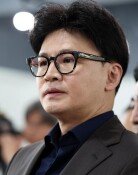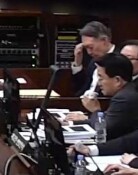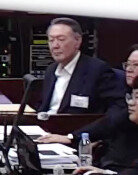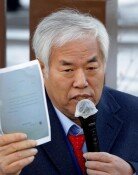Politician-Professors
One out of every three polifessors, a coined term to refer to professors who straddle politics and academia, got elected in the 18th General Election. Most of them are unlikely to give up their teaching position once they become lawmakers.
Based on a list of candidates released by the National Election Commission, the Dong-A Ilbo found that 29 out of 87 professors, including visiting and adjunct professors, or 33.3 percent, became lawmakers. Given that one out of every 4.6 candidates was elected, professors were more likely to get elected than other professionals.
We contacted 18 of the elected officials and asked whether they would resign their professorship. All of them, except for one, did not clearly reply or declined to respond.
○ Changing voters views on professor-candidates
Among the candidates, 19 out of 60 professors won their local elections, and 10 out of 27 got elected through the proportional representative system.
Among the 87, 42 were full-time professors and 45 were lecturers. But the former (45.2 percent) was more likely to be elected than the latter (22.2 percent).
Choi Jin-woo, politics and diplomacy professor at Hanyang University, said, With a small pool of candidates in Korea, professors have become competitive because they are new and have expertise.
When Professor A, who was elected through the proportional representative system of the Grand National Party, introduced himself as a professor during campaigning, a voter asked him, Are you a polifessor?
Its different from the past when everybody always welcomed a professor, he said. It seems like voters want to confirm whether Im a politician just passing through or a new, competent candidate.
Kim Yeon-soo, physical education professor at Seoul National University, ran in the election on maternity leave without the permission of the university. She lost her election. Voters knew a lot about the problems related to polifessors, she said. I think the debate over polifessors had a negative impact.
Polifessors should not always be regarded negatively, as many people view them, said Na Seong-rin, a Hanyang University professor who was elected through the proportional representative system. We need to differentiate some professors who abruptly gave up teaching from those who want to link their expertise to policies.
In response, Kim Hyeong-joon, politics and diplomacy professor at Myungji University, said, Since the Dong-A Ilbo raised the issue of polifessors publicly last year, social awareness of it rose significantly. Voters have become critical of professors who want to jump into politics.
○ Resignation? Not yet
Professor B, a candidate of the United Democratic Party, who was elected in the Chungcheong area said, The university said I did not have to tender my resignation and I would be considered on leave.
Other elected professors were no different. I will decide after consulting with the university, said national university Professor C, who was elected through the proportional representative system. Professor D, who ran in an election in Seoul, said, I was on leave when I ran for election and I will remain on leave.
Only Kim Hyo-seok, Chung-Ang University professor who has been on leave for 11 years since entering politics, said, As I mentioned before, I will tender my resignation.
The College of Education of Chung-Ang University decided to select a new professor on Thursday because Lee Gun-hyeon, professor and a member of the 17th National Assembly, who has been on extended leave, was re-elected.
Lee Il-yong, the dean of the college, said, It is a matter for Professor Lee, but aside from that fact, we will choose another professor. I hope that the higher education law decides this matter of professors leaving and returning.
It is students who are adversely affected by professors who go on leave for a long time, said Cho Jeon-hyeok, economics professor at Incheon University. Cho, who was elected to office in Incheon, promised, I will propose a bill to force two-term lawmaker-professors to choose just one career.







